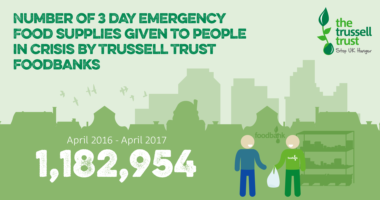Annual use of foodbanks is rising, so it’s bittersweet that so many of us are loosening out waistbands and still surrounded by the excesses of a typical British family Christmas.
And as New Year's Eve approaches, lots of these foods will soon be decluttered to make way for healthier January fare - the boxes of Roses from well-meaning aunties, packets of dates, sugared almonds and marzipan fruits from the neighbours, the family sized tubs of Celebrations, Twiglets and Mini Cheddars, being replaced with fresh fruit and veg, salads and smoothies.
Many of these unwanted treats will end up in food bank donation bins, where the basics of baked beans, tea bags and tinned veg are already shuffling for space with Christmas teas, fancy jams and endless Scottish shortbread.
And whilst the estimated 590,000 people per year who rely on food bank donations may welcome some of your Christmas leftovers, there are numerous essential items, often not food related, which are in greater need.
So next time you pass the food bank drop off at your local supermarket, church or community centre, please consider donating some of the following non food items too, as identified by The Trussell Trust.
Non food items to donate to your local Foodbank:
Deodorant
Toilet paper
Shower gel
Shaving gel
Shampoo
Soap
Toothbrushes
Toothpaste
Hand wipes
Laundry detergent or powder
Washing-up liquid
Sanitary towels
Tampons
Nappies
Baby wipes
Baby food (but not Baby Formula due to UNICEF regulations)
It’s also very helpful to check with your local foodbank as to which items, food or otherwise, they are particularly low on, or have plenty of.
Many, like Exeter Foodbank, issue a monthly priority list which you can find on their social media feeds.
If you and your family are struggling, you can find out more about being referred to your local food bank via the Citizen’s Advice Bureau.
How else can you help:
If you’d like to make a donation or volunteer to support the operation of your local foodbank, find out more here https://www.trusselltrust.org/get-involved/
In 2016/17, The Trussell Trust handed our over 1.8 million emergency food parcels. They operate a network of 400 foodbanks across the UK.





